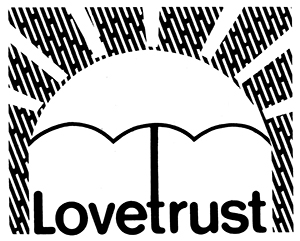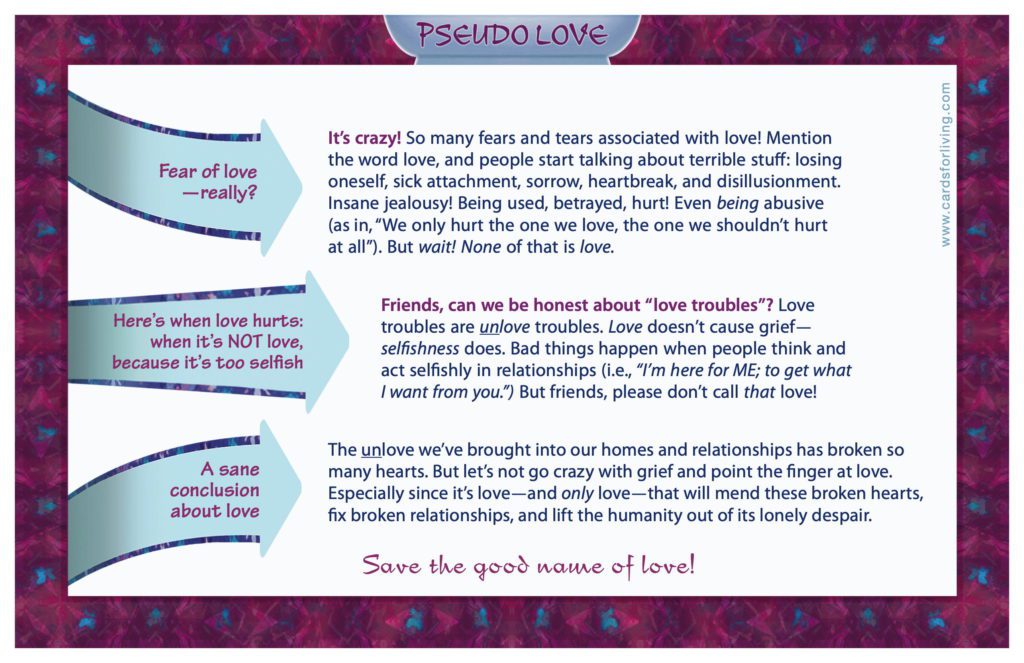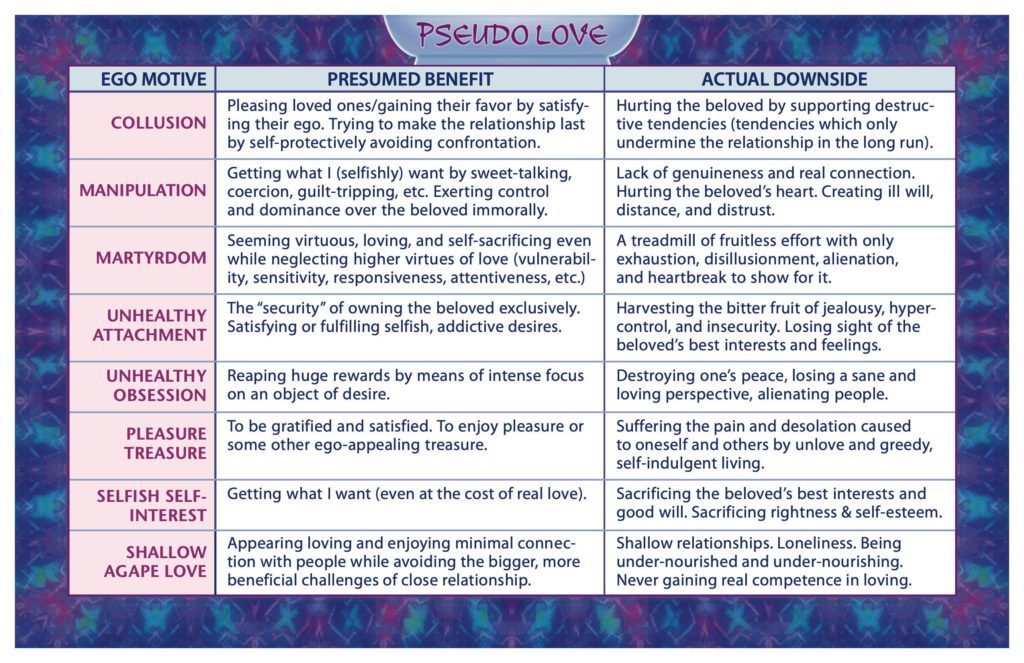

We human beings are kind, generous, and serviceful by nature. It’s in our DNA to give freely to those we love, to those in need, and ultimately, to everyone in our lives. When done in the right spirit, it’s our pleasure to give. And the pleasure is mutual.
But some people are literally “generous to a fault.” They carry giving too far. They exhaust themselves; they go overboard on service, giving beyond what they can sincerely and happily manage. Eventually they become bitter, feeling unappreciated, disappointed, even resentful. Disillusioned with giving. Even skeptical about love. Then, many of them go equally far in the other direction, and vehemently renounce giving: “I’ve had enough! I did this for twenty years. I was all about them. I gave so much, and they didn’t appreciate it. Now it’s time for me to be about me. I’m going to set limits and protect my space. And I’m never going to let myself get in the position where I’m subservient to anybody else, serving anybody else.”
Clearly, when people say they give too much, they have plenty of factual evidence to prove their claim. And they find a lot of encouragement for their reformed “me-first” lifestyle—counselors, support groups, friends and relatives, self-help books and slogans galore. But if we simply take their testimony on face value, it leaves a lot of questions unanswered, and a lot of lingering bad feelings all around. Before we jump on that bandwagon and rubber-stamp their resolve to give no more, let’s take a few minutes to look under the hood at what is really going on—and investigate whether giving less is really the best solution.
Why did these “martyrs” work their fingers to the bone? No one held a gun to their head. As a matter of fact, they had their own reasons for giving, and some of those reasons were selfish. Now, we all have mixed motivations for what we do, some unselfish and some selfish. And it’s perfectly natural when serving or trying to please others to want our gifts to be appreciated, to expect some form of reward, to hope that the exchange will be reasonably mutual.
But for love’s sake, it’s crucial to keep our mixed motivations in balance. When the scale tips toward selfish, givers may become martyrs. Selfishness can drive people to extremes of “giving”—and extremes of insensitivity—in the hopes of getting what they want. Blinded by selfish desire, they exhaust themselves in the service of others, beyond their natural impulse to care, even beyond what their loved ones want from them.
In the book “The Four Loves,” C.S. Lewis related the story of Mrs. Fidget, a classic case in point. His description of her relationship to her family vividly illustrates how selfishness drives the martyr to ignore not only her own limits, but also the will of others.
“Mrs. Fidget very often said that she lived for her family. And it was not untrue. Everyone in the neighbourhood knew it. “She lives for her family,” they said; “what a wife and mother!” She did all the washing; true, she did it badly, and they could have afforded to send it out to a laundry, and they frequently begged her not to do it. But she did. There was always a hot lunch for anyone who was at home and always a hot meal at night (even in midsummer). They implored her not to provide this. They protested almost with tears in their eyes (and with truth) that they liked cold meals. It made no difference….
“She was always making things too; being in her own estimation (I’m no judge myself) an excellent amateur dressmaker and a great knitter. And of course, unless you were a heartless brute, you had to wear the things….
“Mrs. Fidget, as she so often said, would ‘work her fingers to the bone’ for her family. They couldn’t stop her. Nor could they— being decent people—quite sit still and watch her do it. They had to help. Indeed they were always having to help. That is, they did things for her to help her to do things for them which they didn’t want done.”
It wasn’t really for her family that Mrs. Fidget smothered them with her gestures of “service.” She was serving herself—trying, ineffectively to be needed, to inspire their gratitude, to earn their devotion. And she was hoping to buy these rewards with the coin of physical service, while avoiding the more challenging demands of loving—real generosity of spirit, moment-to-moment sensitivity, actual surrender to the needs and wants of loved ones, and truly stringless giving.
But mere physical service can’t buy the pearl of great price. That’s why a wife discovers there’s no number of times she can clean up the house, cook dinner, and do serviceful things that will make her husband love her. There is no amount of those things that will really please him, because his soul is crying for something more, something deeper, something more beautiful, than all that. It’s the same with a husband’s honey-do list and long hours away at work. There’s no amount of mowing the lawn and paying the bills that will make his spouse feel really loved. This is not to say physical service is a bad thing. It’s only to say, service alone is not sufficient. It does not fulfill the hollow leg of the heart. It does not fill the bill for love.
There’s another reason why a martyr’s excessive service ends up unappreciated. The response to gifts always depends more on the intention behind them than on the gifts themselves. No matter what we do, people can feel why we’re doing it. A gift with strings attached feels more like a bargaining chip than a real gift. A complaint about giving too much feels more like score-keeping than a testament to one’s real virtue. The selfish motivations behind the martyr’s giving reduce the perceived quality of the gifts and thus the amount of appreciation they inspire. That’s why selfish behavior, in any quantity, fails to satisfy anyone. It’s not being done in the right spirit.
Still pursuing their hoped-for rewards, martyrs are slow at learning this lesson and reluctant to adjust. When the service rendered isn’t adequately appreciated, martyrs simply redouble their efforts. But gifts polluted with selfishness are spiritual junk food, empty calories. So the martyr is on a hopeless treadmill, unable to satisfy the emotional hunger of loved ones no matter how much they give and how endlessly they serve. No wonder the martyr feels depleted.
Obviously, the martyr’s depletion cannot be cured by being more about “me” and less into giving, as most reformed martyrs believe. Instead, they need to reduce the selfishness in their motivations. When they do, they will have a more balanced life. They will no longer be motivated to exceed their ability to happily and genuinely serve. They will regain their awareness of others and what others truly need and want, so they can tune their giving accordingly. They will reconnect with their own selfless motivation to serve, which every human being natively has. And they will begin to reap all the natural rewards of giving in the right spirit.
Consider the profound effects of a loving attitude and orientation in a father who is going out to cut firewood, or earn money to support his family. If he knows he is expressing love through his service, that knowledge transforms work that could otherwise be a grumbling, resentful obligation into a happy, sincere act of love. Gone is the inner conflict of thinking, “Why can’t I be relaxing right now? I’m having to chop this wood because my family needs me to do it. This is taking away from my personal well-being—etc.” Such inner conflict would deprive anyone of the real joy of unselfish giving.
When a former martyr starts giving unselfishly, they will experience the truth of the saying, “giving is its own reward.” They will experience the inner happiness and peace that comes from loving truly and selflessly. And others will begin to appreciate their gifts, and love them back.
At the same time, they will stop proving to themselves that love is disappointing, that people can’t be satisfied, that service is inherently depleting, that generosity leads to exhaustion, and that wholehearted, free giving is foolish. And they will stop preaching those false and depressing conclusions to others.
The cure for martyrdom is not more selfishness, it’s less selfishness. Martyrs don’t need to stop giving; they need to give in a right and loving spirit. And they need to sincerely cultivate and share the higher gifts of love, like vulnerability, sensitivity, responsiveness, attentiveness, etc.
Selfishly motivated service never feels right, to the giver or the receiver. Now you know why.
Let’s call a spade a spade. People who say they “give too much” are probably giving too selfishly.
Martyrdom is just one way that unlove masquerades as love. To learn more about the difference between love and unlove and other common examples, download or print the Pseudo Love Card from the Cards for Living website.
Love,
Your friends at LoveTrust



